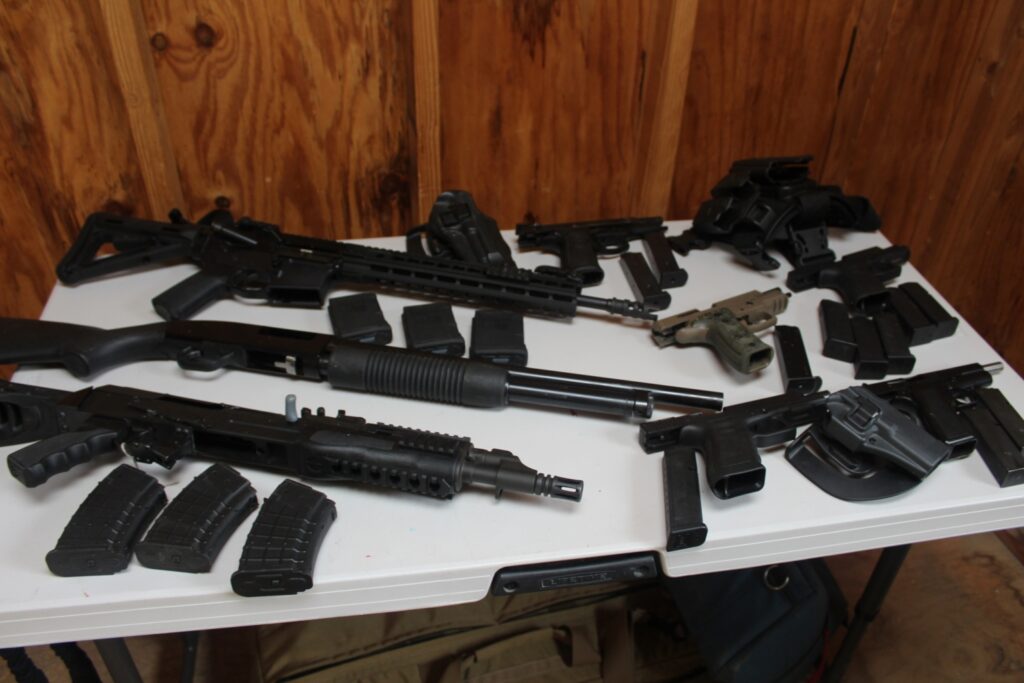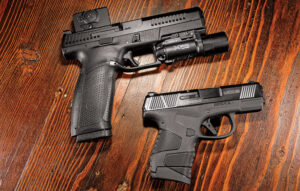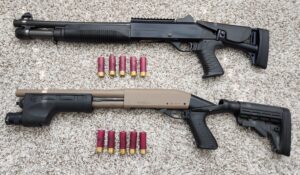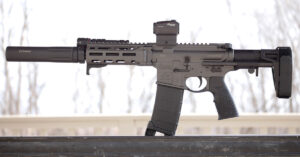
Choosing the right firearm for home defense can be overwhelming, especially with so many options available. Handguns, shotguns, and rifles each have their own strengths and weaknesses, making them suitable for different defense strategies. To help you make an informed decision, let’s explore the pros and cons of each type of firearm for home defense.
Handguns for Home Defense
Positives
Compact and Easy to Maneuver: Handguns are small and lightweight, making them easier to carry and maneuver in tight spaces like hallways and rooms. This is crucial in a home defense scenario where you may need to move quickly and efficiently.
Quick Access and Concealability: Handguns are easy to store in places that offer quick access, like a bedside safe or nightstand drawer. Their size makes them more practical for everyday carry and storage.
Easier to Operate One-Handed: In a home defense situation, you may need to use your other hand for tasks like dialing 911, opening doors, or guiding family members to safety. A handgun allows for one-handed operation, giving you more flexibility.
Negatives
Less Stopping Power: Compared to shotguns and rifles, handguns generally have less stopping power. You may need to fire multiple rounds to stop an intruder, and in high-stress situations, accuracy can be more difficult to maintain.
Harder to Aim Accurately: Handguns require more precision to shoot accurately, especially at longer distances. For those less experienced with firearms, it may take more training to effectively use a handgun for home defense.
Shotguns for Home Defense
Positives
High Stopping Power: One of the biggest advantages of shotguns is their significant stopping power. A well-placed shot with buckshot or slugs can immediately incapacitate an intruder, making it an excellent choice for home defense.
Wide Spread of Pellets: When using buckshot, a shotgun fires multiple projectiles in a spread pattern, which increases your chances of hitting a target, especially in high-stress situations when accuracy may be compromised.
Psychological Deterrent: The sound of a pump-action shotgun being racked is universally recognized and can act as a psychological deterrent, potentially scaring off intruders before a shot is even fired.
 Negatives
Negatives
Difficult to Maneuver in Tight Spaces: Shotguns tend to be larger and bulkier, which can make them difficult to maneuver in confined spaces like hallways or small rooms. This can limit your mobility when navigating your home.
Significant Recoil: Shotguns have substantial recoil, especially with heavier loads like buckshot or slugs. This can make them harder to control, particularly for smaller or less experienced shooters.
Limited Ammunition Capacity: Most shotguns have a limited magazine capacity, usually ranging from 5 to 8 rounds. While these rounds pack a punch, the need to reload can be a disadvantage in a prolonged encounter.
Rifles for Home Defense
Positives
Longer Range and Precision: Rifles, particularly AR-15-style platforms, offer superior accuracy and range compared to handguns and shotguns. This is useful in larger homes or situations where precision is key, such as targeting an intruder from a distance.
Higher Magazine Capacity: Rifles typically have larger magazine capacities, often holding 20 to 30 rounds. This means you have more rounds at your disposal without the need to reload as often, which could be crucial in a home defense scenario.
Low Recoil (in Certain Calibers): Many rifles, especially those chambered in lighter calibers like .223 or 5.56 NATO, have relatively low recoil, making them easier to control during rapid fire or in stressful situations.
Negatives
Over-Penetration Risk: One of the biggest concerns with rifles, especially in a home defense scenario, is the risk of over-penetration. Rifle rounds can easily pass through walls, posing a danger to others in the home or neighboring houses.
Less Maneuverability Indoors: Like shotguns, rifles can be long and difficult to maneuver in tight spaces. If you need to quickly move through your home or take cover, the rifle’s size may slow you down.
Noise and Muzzle Flash: Firing a rifle indoors creates a significant amount of noise and muzzle flash, which can be disorienting to the shooter. In a home defense situation, this can make it harder to maintain focus and accuracy.
Conclusion
Each type of firearm—handgun, shotgun, or rifle—has its own unique advantages and disadvantages when it comes to home defense.
- Handguns offer maneuverability and ease of use but may lack stopping power and accuracy.
- Shotguns provide devastating stopping power and a wide spread but can be challenging to handle in tight spaces.
- Rifles excel in precision and magazine capacity but carry a high risk of over-penetration and are harder to maneuver indoors.
Ultimately, the best firearm for home defense depends on your specific needs, level of experience, and home layout. Regardless of which type you choose, training and practice are essential to ensure that you can confidently and safely use your firearm in a home defense scenario.
